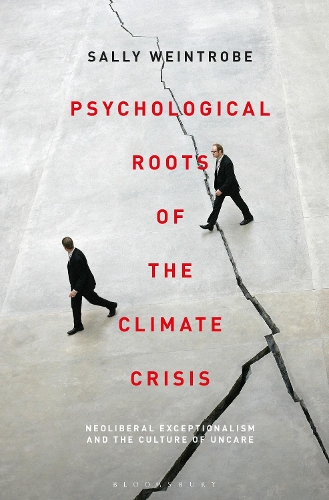
Psychological Roots of the Climate Crisis: Neoliberal Exceptionalism and the Culture of Uncare
(Hardback)
Available Formats
Publishing Details
Psychological Roots of the Climate Crisis: Neoliberal Exceptionalism and the Culture of Uncare
By (Author) Sally Weintrobe
Bloomsbury Publishing PLC
Bloomsbury Academic USA
3rd June 2021
8th April 2021
United States
Classifications
Tertiary Education
Non Fiction
Environmentalist thought and ideology
Psychoanalytical and Freudian psychology
155.915
Physical Properties
Hardback
344
Width 140mm, Height 216mm
549g
Description
Psychological Roots of the Climate Crisis tells the story of a fundamental fight between a caring and an uncaring imagination. It helps us to recognise the uncaring imagination in politics, in culture - for example in the writings of Ayn Rand - and also in ourselves. Sally Weintrobe argues that achieving the shift to greater care requires us to stop colluding with Exceptionalism, the rigid psychological mindset largely responsible for the climate crisis. People in this mindset believe that they are entitled to have the lions share and that they can rearrange reality with magical omnipotent thinking whenever reality limits these felt entitlements. While this book's subject is grim, its tone is reflective, ironic, light and at times humorous. It is free of jargon, and full of examples from history, culture, literature, poetry, everyday life and the authors experience as a psychoanalyst, and a professional life that has been dedicated to helping people to face difficult truths.
Reviews
Among the lessons Weintrobes book holds for climate scientists is that human vulnerability to climate change cannot be measured on a simple quantitative scale running from the most vulnerable populations to the most resilient. To be sure, the risks of climate change are distributed highly unevenly, with poor, marginalized communities likely to suffer the worst effects. Yet, for the privileged readers to whom Weintrobe addresses this book, vulnerability is not the opposite of resilience. Rather, feeling vulnerable is the first step toward building sustainable relationships. * Science *
Weintrobe brilliantly weaves together insights from psychology, economics and environmental science. Her book offers a vital critique of neoliberal orthodoxies and the social, psychological and ecological toll that they have exacted. But she also charts a way forward, one that begins by regenerating our embattled cultures of care. This book is a tour de force. * Rob Nixon, Barron Family Professor of Environment and Humanities, Princeton University, USA *
The distinction between the caring and uncaring parts of the human psyche was, for me, a new and powerful formulation one that sheds much light on the mess we find ourselves in and perhaps offers some routes out! * Bill McKibben, author of Falter: Has the Human Game Begun to Play Itself Out *
In his first speech as U.S. President-Elect, Joe Biden said: Our nation is shaped by the constant battle between our better angels and our darkest impulses. It is time for our better angels to prevail. His words are a fitting endorsement of Sally Weintrobes new book Psychological Roots of the Climate Crisis: Neoliberal Exceptionalism and the Culture of Uncare. In it she peels back the lid on human exceptionalism and our ability to "uncare." She argues convincingly that these elemental features of the dominant neoliberal economic and political creed lie at the heart of the climate crisis. Unless and until we reassert our fundamentally caring nature, our ability to recognise planetary limits and retain control of our climatic destiny will continue to slip away. The book provides a powerful case that although technological solutions driven from within free markets will help to lessen the climate crisis, they will not be enough. Human behaviour will need to change also. * Chris Rapley, CBE, Professor of Climate Science, University College London, UK *
Sally Weintrobe uses her psychoanalytic mind and her sociocultural experience to create a brilliant presentation of intersecting historical, political, economic and psychological determinants of the climate crisis. She uses personal, clinical, literary, biblical, sociological, economic, and scientific information and metaphors to bring alive the overwhelming realities of ecocide and denialism. Her detailed elaboration of neoliberal exceptionalism and the current Western culture of uncare sets what she terms the bubble of disavowal in bold context. Her own care for the safety of the planet and its human and animal inhabitants permeates the aspect of this book that inspires the reader to face the crisis and become an agent of change. * Harriet L. Wolfe, M.D., President-elect, International Psychoanalytical Association, and Clinical Professor of Psychiatry and Behavioral Sciences, University of California San Francisco, USA *
The problem of climate change has, for a generation, produced nothing approaching an adequate response particularly among those in the wealthy west, many of whom see themselves as triumphalist technocrats capable of fixing anything at all. In her brilliant, dizzyingly insightful book, Sally Weintrobe explains why: a political culture that teaches those in the global north that they are not just entitled to a stable and prosperous world but entitled, as well, to live as though they had no responsibility for preserving it, indeed entitled to guiltlessness and ignorance at once. As she writes, neoliberalism is an ideology of power, but it is built through psychological appeals we have tragically come to accept as "reality." We are, she writes, living in Wonderland though not for long. * David Wallace-Wells, editor-at-large of New York Magazine and author of The Uninhabitable Earth *
Weintrobes book holds invaluable insights for people of all ages and masterfully breaks down academic jargon for a popular audience. * Harvard Political Review *
Author Bio
Sally Weintrobe is a Fellow of The British Psychoanalytical Society, a founder member of the Climate Psychology Alliance and she Chairs the International Psychoanalytic Associations (IPAs) Committee on Climate. In 2021 she won an award from the IPA for her work on climate. Her past publications include, as editor and contributor, Engaging with Climate Change, short-listed in 2014 for the International Gradiva Prize for contributions to psychoanalysis.
